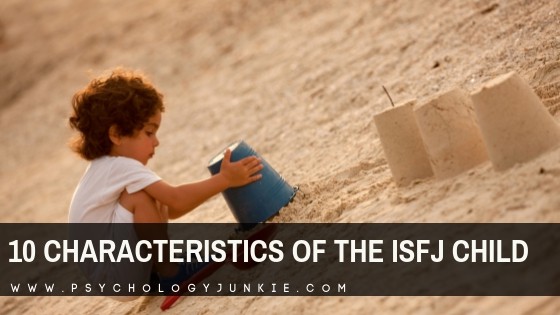10 Characteristics of the ISFJ Child
ISFJs, often called “The Nurturers”, are known for their pragmatic and gentle nature. Individuals with this personality type are observant, attentive to detail, and highly in tune with the emotional environment around them. Today I want to take a look at some of the unique experiences that these types encounter in childhood. If you’re the parent of an ISFJ or you’re an ISFJ yourself then this article will hopefully give you some insight into the unique feelings, struggles, and joys that this type encounters early on.
Not sure what your personality type is? Take our new personality questionnaire!

Table of contents
- 10 Characteristics of the ISFJ Child
- #1 – They Like Repetition
- #2 – They Like Stability
- #3 – They Tend to Excel with Fine-Motor Skills
- #4 – They Care Deeply
- #5 – They Are Easily Over-Stimulated
- #6 – Clarity is Essential to Them
- #7 – They Are Pragmatic
- #8 – They Like Being Alone
- #9 – As They Hit the Teens, They Want Increasing Control
- #10 – They Are Goal-Oriented and Singularly Focused
Estimated reading time: 6 minutes
10 Characteristics of the ISFJ Child
#1 – They Like Repetition
ISFJs want to achieve mastery in the things that interest them. They like to repeat a process again and again till they know they’ve got it right and it’s second-nature to them. This can show in many ways, like going over the times tables in a song, playing scales on a piano, or memorizing the words to a favorite song or story. The more they repeat something the more they feel confident in their ability with it.
#2 – They Like Stability
ISFJs don’t like being thrown into situations they aren’t prepared for. Unexpected changes can shake them up emotionally and make them feel afraid or anxious. They want to know what to expect on a given day and they like to plan ahead. A steady, consistent routine helps them to feel safe and secure. While vacations and spontaneous adventures can be exciting for them, they might feel a little tense when they are thrown out of their comfort zone. They tend to need more time to decompress after a vacation or an unexpected experience.
#3 – They Tend to Excel with Fine-Motor Skills
ISFJ youngsters tend to pick up small motor activities fairly early on. They enjoy analyzing their toys, exploring the different ways they can be used, and playing with them for a long period of time. They tend to play for longer periods with one toy than many other types who shift from one to the other very quickly. They tend to pick out one favorite toy or stuffed animal that they like to keep near them as much as possible or sleep with at night.
#4 – They Care Deeply
ISFJ children who are raised in a healthy environment are very devoted and trusting children. They long to please and care for their family members, especially younger siblings who they feel need protection. They are typically mature for their age, aware of what people need, and anxious to surprise their parents or siblings with unexpected gifts or acts of service (like breakfast in bed on Mother’s Day).
#5 – They Are Easily Over-Stimulated
ISFJs like a peaceful atmosphere where they can focus on one activity at a time. They don’t like a lot of noise, bright lights, or hubbub that pulls their attention in too many directions. Being unexpectedly sneaked up on can startle them immensely and being forced into highly-active social atmospheres can make them feel tense if they aren’t given adequate alone time before and afterward.
This same sensitivity can apply to textures and foods that ISFJs eat. They tend to be very aware of flavors and tastes and can seem finicky to parents of other preferences. Their highly developed awareness of internal sensations makes it hard for them to ignore things like unusual textures, cold, heat, or even sickness or fatigue. They may seem more alert to their body’s signals than other types.
#6 – Clarity is Essential to Them
ISFJs tend to be very literal and pragmatic. They enjoy clear, linear instructions. They hate vague, roundabout rules or instructions. They like having all the specifics laid out and they want to know exactly what is expected of them. They will often ask clarifying questions of the people around them to be absolutely certain that they understand what is needed and what someone’s intention is.
#7 – They Are Pragmatic
ISFJ children, while gentle and empathetic, are also highly in touch with what’s real. They are often interested in learning about things like the human body, nature, animals, and the way the world works. They don’t tend to like being dirty, but they can easily roll up their sleeves and get to work if they see a natural reason to do so. They are more focused on real-world experiences and how they can make a tangible difference in the world than imaginative hypotheses and escapes. This, however, doesn’t mean they don’t imagine. In fact, many young ISFJs enjoy playing pretend, reading fantasy stories, or watching movies like Harry Potter or E.T. But when it comes to their long-standing interests, they tend to be more of a practical nature than dreamy.
#8 – They Like Being Alone
While other children might seek out near-constant social stimuli, ISFJs enjoy playing quietly on their own where they can focus as intensely as they naturally like to. They enjoy having one or two very close friends or “kindred spirits” over large groups of friends. They tend to be attracted to either gentle, soft-spoken children like themselves or outgoing, gregarious, exuberant children who compensate for their natural reserved nature.
#9 – As They Hit the Teens, They Want Increasing Control
Like many teens, ISFJs want to take on more and more of their own responsibilities as they grow older. They don’t like being over-managed by their parents and will often do whatever they can to stay on top of homework, saving money, cleaning, and completing other tasks on their to-do lists. They like having their own set of responsibilities and will dislike being “babied” or micro-managed.
#10 – They Are Goal-Oriented and Singularly Focused
ISFJs children often work hard in the pursuit of a goal they set out to achieve. They are very methodical and like breaking big projects down into step-by-step sequences. They are very committed to “working before play” and achieving the goals they set out for themselves. They dislike being interrupted, distracted, or pulled in so many different directions that they can’t finish one thing at a time.
What Are Your Thoughts?
Did you enjoy this article? Do you have any thoughts or insights to add? Let us know in the comments! Not sure what your child’s personality type is? Take our questionnaire here!
Find out more about your personality type in our eBook, Discovering You: Unlocking the Power of Personality Type.

Other Articles You Might Enjoy:
7 Reasons Why You Need an ISFJ Friend in Your Life
The ISFJ Personality Profile – an In-Depth Look at “The Nurturer”
10 Things You’ll Relate to if You’re an ISFJ
The Timeless Power of Introverted Sensing












I enjoyed the article. In regards to number three the motor skills I could not really identify with being a child and a toy however I am very observant and as a child I recall watching my father take on many projects around the house so now as an adult I utilize the skills such as painting maintaining the lawn, little plumbing jobs etc. and when it references being pragmatic, I could not really relate to the movies that were referenced as I am really not into Sci-fi however I do enjoy documentaries and watching nature programs or learning how things work. Thankyou for publishing this information and ever since I have learned of my personality is really fascinating learning more about myself
Awesome Content. I think that ISFJ youngsters tend to pick up small body activities fairly early on. They enjoy analyzing their toys, exploring the different ways they can be used and playing with them for a long period of time. I also think the benefits of hobbies for kids made simple life. Thanks a lot…
This was me as a child. Boy, you really hit the nail on the head with these descriptions!